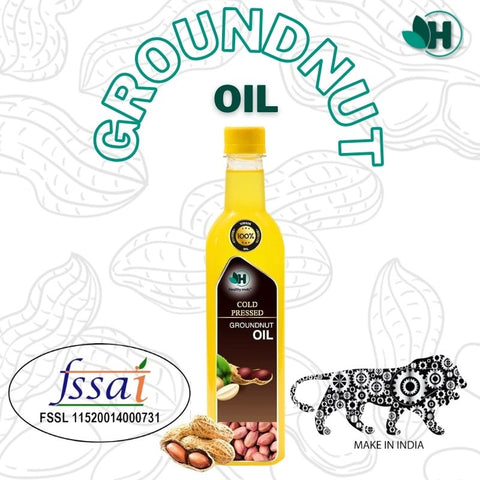Cold pressed groundnut oil, also known as Kachi Ghani groundnut oil, is a nutritious cooking oil primarily used in traditional Indian cuisine. It is the top choice for health-conscious individuals seeking authentic flavors and wholesome ingredients.
Organic groundnut oil, extracted using cold pressed methods, retains its natural goodness, aroma, and nutrients. A staple in every Indian kitchen, it is commonly used in various recipes and even for deep frying. According to Ayurveda, groundnut oil possesses properties that balance, heal, and treat individuals suffering from kapha and pitta doshas.
Now, let's delve into the extensive range of Benefits of cold-pressed groundnut oil brings to your kitchen and overall well-being.
Key Takeaways Cold Pressed Groundnut Oil
- Enhances heart health by improving cholesterol levels.
- Boosts the immune system with antioxidants.
- Supports weight management and metabolism.
- Assists in managing diabetes and blood sugar.
- Suitable for high-temperature cooking due to a high smoke point.
Benefits of Cold Pressed Groundnut Oil
- It is packed with heart-healthy fats
Full of monounsaturated fats & antioxidants with zero cholesterol, groundnut oil can elevate the levels of “good” cholesterol while lowering bad cholesterol.
- It boosts the immune system
Cold pressed groundnut oil contains vitamins and antioxidants that build a stronger immune system.
- It aids weight management
Most people are not aware of this, but cold-pressed groundnut oil can aid in metabolism and support healthy weight goals.
- It helps manage diabetes
Research has been shown that cold-pressed groundnut oil may assist in managing blood sugar levels, especially for individuals with insulin resistance.
- It soothes and moisturizes skin
Groundnut oil is not just healthy for internal health, but also offers soothing and moisturizing benefits for the skin, enhancing its natural radiance and texture.
Ways for Cooking With Cold Pressed Groundnut Oil

We should be grateful for cold pressed groundnut oil, thanks to its high smoke point. This versatile oil is ideal for both general cooking and adding flavor to dishes. Here are some tips for cooking with cold pressed groundnut oil:
- Flavor Enhancement
Use cold pressed groundnut oil as a dressing for salads or drizzle it over cooked vegetables to enhance their flavor.
- High temperature cooking
Perfect for high-temperature cooking methods like grilling, frying, sautéing, and roasting, cold pressed groundnut oil's nutty aroma and flavor will tantalize your taste buds.
- Baking
Substitute butter with cold pressed groundnut oil in baking for a healthier option that provides a moist texture to cakes and bread.
Conclusion
In conclusion, cold pressed groundnut oil has a wide ranging benefits, from promoting heart health and managing diabetes to nourishing skin and enhancing culinary creations. By incorporating Kachi Ghani Groundnut Oil into your daily diet and skincare routine, you can harness these advantages and foster a healthier lifestyle.
Additionally, Its high smoke points makes it safe for daily cooking. Whether for health benefits or culinary delights, cold-pressed groundnut oil stands as a versatile and invaluable asset in your everyday life.
At Healthy Roots, our groundnut oil is crafted through the traditional Kachi Ghani method, ensuring a pure product without any chemicals, preservatives, or additives. It's perfectly safe for daily consumption. Discover more about the natural goodness of Healthy Roots Cold-Pressed Groundnut Oil by visiting our website at healthyroots.com
Frequently Asked Questions
Is groundnut oil cholesterol-free?
Yes, groundnut oil contains zero cholesterol, making it an excellent choice for those looking to manage their cholesterol levels. Regular uses help in reducing bad cholesterol in the body while promoting heart health.
What is the cost of cold pressed groundnut oil?
The price of cold pressed groundnut oil varies based on brand, quality, and region. It's advisable to compare prices across different platforms to acquire the best deal, keeping an eye on quality indicators such as organic certifications and cold pressing methods.
What nutritional values do groundnuts offer?
Groundnuts are a rich source of proteins, good fats, fiber, and essential vitamins like Vitamin E. Apart from these, they also contain minerals such as phosphorus and magnesium, which contribute to overall health benefits, including enhanced heart health and anti-inflammatory properties.
What's the difference between cold-pressed and regular groundnut oil?
Cold-pressed groundnut oil is extracted at low temperatures without the use of chemicals or heat to preserve the natural flavors, colors, and nutritional value. Regular groundnut oil, however, may lose some of these qualities during extraction, which often involves higher temperatures and chemical processes.
Can you use cold pressed groundnut oil for deep frying?
Yes, cold pressed groundnut oil is an excellent choice for deep frying due to its high smoke point, which ensures that it remains stable at high temperatures and retains its nutritional value.
How should cold-pressed groundnut oil be stored?
Unopened cold pressed groundnut oil can be stored a year while opened bottled four to six months before turning rancid. To keep oil fresh for a long time, it should be stored in a cool, dark place and use an airtight container to avoid oxidation.
Can we eat groundnut oil daily?
Yes, you can use cold pressed groundnut oil daily in moderation to avoid excess calorie intake.
Who should not consume groundnut oil?
People with peanut allergies should avoid it. Others should consult their doctor if unsure.
What are common uses of cold pressed groundnut oil in cooking?
Cold pressed groundnut oil is excellent for frying, sautéing, baking, and grilling due to its neutral flavor and high smoke point. It's also commonly used in dressings and marinades to enhance the taste of various dishes.

